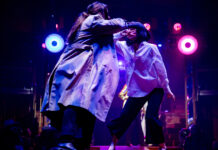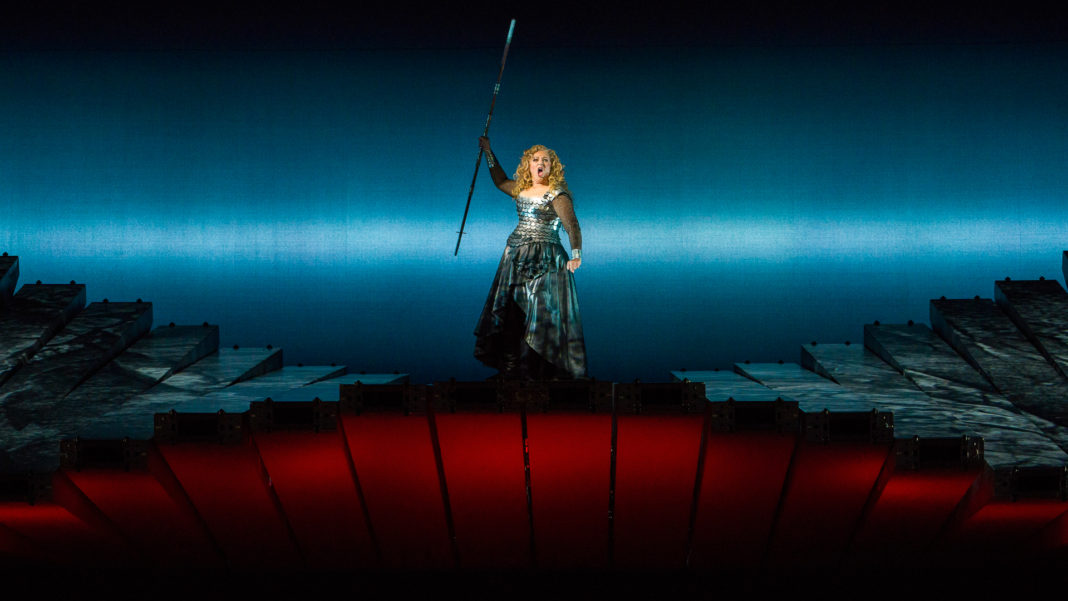It’s the last Monday in July which means it’s also the start of Week 20 at the Met. For fans of Italian opera you have a lot to watch this week as five of the seven productions are by Donizetti, Puccini and Verdi. If you want something non-Italian, there’s one of Dvořák’s operas and one of the four operas that make up Wagner’s Der Ring des Nibelungen.
Each opera becomes available at 7:30 PM EDT/4:30 PM PDT and remains available for 23 hours. However, there is an exception this week. Friday’s opera, Dvořák’s Rusalka, will only be available until 12:00 PM EDT/9:00 AM PDT on Saturday as the Met is offering a live recital by Renée Fleming at 1:00 PM EDT/10:00 AM PDT Saturday afternoon.
All productions can be found on the Met Opera website. Schedules and times are subject to change.
If you read this early enough on Monday, you might still have time to watch the 2018-2019 season production of Puccini’s La Fanciulla del West (in case you wanted to add another Italian opera to your schedule this week!)
Here is the line-up for Week 20 at the Met:
Monday, July 27 – Donizetti’s Lucia di Lammermoor
Conducted by Patrick Summers; starring Natalie Dessay, Joseph Calleja, Ludovic Tézier and Kwangchul Youn. This revival of the 2007 Mary Zimmerman production is from the 2010-2011 season.
Sir Walter Scott’s novel The Bride of Lammermoor was the inspiration for Gaetano Donizetti’s opera, Lucia di Lammermoor. Salvadore Cammarano, who collaborated with the composer on seven operas, wrote this libretto. This opera had its world premiere in Naples in 1835.
The opera, set in Scotland in the early 18th century, is a truly tragic love story. Lucia and Edgardo are secretly in love. They keep their love a secret as they are from opposing families. Her brother keeps them from getting married by lying to Lucia about Edgardo having married another woman. So deep is her despair that she turns to murder and ultimately devolves into madness.
When this production was first presented in 2007, Dessay also sang the title role. Zachary Woolfe, writing for the New York Times felt this return of the production after seven years allowed the men to shine.
“The manipulative brother Enrico, sung richly and acted with laconic ruefulness by Ludovic Tézier, seems almost reasonable in his heartless demands. Kwangchul Youn had burnished tone and great dignity as the well-meaning chaplain Raimondo. Even Arturo, the arranged husband Lucia murders, was charming as sung by the young tenor Matthew Plenk.
“And Joseph Calleja was sensationally ardent as Lucia’s lover, Edgardo, one of the best roles of his young, exciting Met career.”
Tuesday, July 28 – Puccini’s Tosca
Conducted by Joseph Colaneri; starring Karita Mattila, Marcelo Álvarez and George Gagnidze. This Luc Bondy production is from the 2009-2010 season.
It is quite likely that Puccini’s Tosca was the first opera to premiere in 1900. Its first performance was on January 14 in Rome. Based on Victorien Sardou’s 1887 play of the same name, Tosca‘s libretto was written by Luigi Illica and Giuseppe Giacosa.
The setting for Tosca is Rome in 1800. The Napoleonic wars were raging and political unrest was omnipresent. The opera takes place over the course of slightly less than 24 hours. Floria Tosca (Verrett) is the object of Chief of Police Baron Scarpia’s (MacNeil) lust. He uses suspicions that her lover, Mario Cavaradossi (Pavarotti), aided a political prisoner who has escaped as an opportunity to get him out of his way which will leave Tosca for himself. After capturing Cavaradossi, Scarpia says that if Tosca doesn’t become his lover, he will have Cavaradossi killed.
This Luc Bondy production replaced the Franco Zeffirelli production that had been a staple at the Metropolitan Opera since 1985. Darker, colder and much more spare than the opulent Zeffirelli production, Bondy’s work elicited so many boos after the performance that the audience reception became the lead in most stories and reviews. So is it really that wrong? We’ll find out Tuesday.
Wednesday, July 29 – Verdi’s Rigoletto
Conducted by James Levine; starring Ileana Cotrubas, Plácido Domingo and Cornell MacNeil. This John Dexter production is from the 1977-1978 season.
Victor Hugo, the author of Les Míserables, was also a playwright and it was his play, Le roi s’amuse, that served as the inspiration for Giuseppe Verdi’s opera. Francesco Maria Piave, who regularly collaborated with the composer, wrote the libretto. The opera had its world premiere in Venice, Italy in 1851.
The title character is a jester who serves the Duke of Mantua. The Duke is a seductive man who, upon learning that the woman with whom Rigoletto lives is his daughter and not his wife, makes the young woman, Gilda, his next target. Curses, assassination plots and more leave this clown without much to smile about.
Most of the stars of this production were singing Rigoletto for the first time at the Met according to New York Times critic Harold C. Schonberg. He said of the singing, “Vocally, this was one of the best Rigoletto performances of our times. Everybody was in good voice.”
He raved about Domingo’s performance in particular:
“Then there was Placido Domingo, in brilliant voice this season, singing the Duke with confidence, amplitude of sound, secure top notes, an even scale and the most appealing of tenor texture.”
Thursday, July 30 – Verdi’s Il Trovatore
Conducted by Marco Armiliato; starring Sondra Radvanovsky, Dolora Zajick, Marcelo Álvarez and Dmitri Hvorostovsky. This revival of the 2009 David McVicar production is from the 2010-2011 season.
Giuseppe Verdi’s Il Trovatore is based on the play El trovador by Antonio García Gutiérrez published in 1836. The libretto was written by Salvadore Cammarano with additions by Leone Emanuele Badare. The opera had its world premiere in Rome in 1853.
The setting is Zaragoza, the capital of the Kingdom of Aragon, circa 1412. To offer up a quick synopsis here would be a fool’s game to play. Several stories happen simultaneously and sometimes share the same characters. The opera has rarely been hailed for its story, but it certainly ranks as one of Verdi’s finest compositions.
If you think I was a bit unfair about the plot in Il Trovatore, let me share with you what Zachary Woolfe said at the start of his review of this production in the New York Times:
“With its cackling Gypsies, mistaken identities and secret brothers, the convoluted plot of Verdi’s Trovatore can seem like the setup for a joke. Already verging on chaos, it makes a natural backdrop for the anarchic final scene of the Marx Brothers’ Night at the Opera.
“Il Trovatore overcomes its absurdities, though, with its vitality, its irresistible melodies and tightly driven rhythms.”
Friday, July 31 – Dvořák’s Rusalka
Conducted by Mark Elder; starring Kristine Opolais, Katarina Dalayman, Jamie Barton, Brandon Jovanovich and Eric Owens. This Mary Zimmerman production is from the from the 2016-2017 season.
Rusalka was Antonín Dvořák’s ninth opera and was based on fairytales. Poet Jaroslav Kvapil wrote the libretto. Rusalka had its world premiere in Prague in 1901.
In essence, this is the same story told in Hans Christian Anderson’s The Little Mermaid. A water sprite, Rusalka, tells her father she has fallen in love with a human prince and wants to join him in his world. He asks her to see a witch who gives her a potion to join the prince, but there are conditions: Rusalka will no longer be able to speak and she loses the opportunity to be immortal. More importantly, if the Prince does not stay in love with her, he will die and Rusalka will be damned for all eternity. This is definitely not a Disney version of the story.
Zimmerman’s production was a certified hit. The director won a Tony Award for her production of Metamorphoses and critics raved about both the look and approach to Dvořák’s dark opera. She didn’t shy away from the darker aspects of the story.
Saturday, August 1 – Verdi’s Ernani
Conducted by James Levine; starring Leona Mitchell, Luciano Pavarotti, Sherrill Milnes and Ruggero Raimondi. This Pier Luigi Samaritani production is from the 1983-1984 season.
The trio of Verdi, Hugo and Piave served as the foundation for this opera that had its world premiere in Venice in 1844 (seven years before Rigoletto.) Hugo’s 1830 play, Hernani, inspired the composer and his librettist for Ernani.
Set in 16th century Spain, the centerpiece of this opera is our heroine, Elvria, who finds herself the object of three men’s desires: Carlo, the King of Spain; Silva, her abusive uncle and our title character, Ernani who is a bandit formerly known as Don Juan of Aragon. Disguises, deceit, mercy, suicide and tragedy ensue.
If you read last week’s preview of Tannhäuser and Donal Henahan’s comments from his New York Times review, you’ll know that he was a very witty writer. He began his review of this production with some historical perspective as only he could:
“Ernani is an important opera because it is by Giuseppi Verdi. Other than that, its attractions are modest. It is, in fact, third-rate Verdi, which makes it second-rate anyone else, or better. It is a mass of musical and dramatic cliches, but operagoers with an ear tuned to history find it fascinating for what it led up to.”
Henahan won the Pulitzer Prize for Criticism in 1986. He passed away in 2012.
Sunday, August 2 – Wagner’s Die Walküre
Conducted by Philippe Jordan; starring Christine Goerke, Eva-Maria Westbroek, Jamie Barton, Stuart Skelton, Greer Grimsley and Günther Groissböck. This revival of Robert Lepage’s 2013 production is from the 2018-2019 season.
This is the second opera in Richard Wagner’s Der Ring des Nibelungen (also known as The Ring Cycle.) It had its premiere as a stand-alone opera in 1870 in Munich. The first performance of the entire cycle was at Bayreuth six years later. Wagner wrote the libretto as well as the music.
The son of the god Wotan is a fugitive named Siegmund. When he finds himself taking refuge at Sieglinde’s house, the two fall passionately in love. But Sieglinde is married and in order for her and Siegmund to be together Siegmund must defeat her husband in a battle to the death.
I’ve seen Christine Goerke sing music from Wagner’s Der Ring des Nibelungen in concert and can attest to the fact that she is amongst the finest and best Wagnerian sopranos working today. Her presence in this production (which drew very mixed reviews and faced challenges with its technology when first performed in 2013) is reason enough to watch this Die Walküre.
That’s the full line-up for Week 20 at the Met. Enjoy your week of opera!
Photo: Christine Goerke Die Walküre. (Photo by Richard Termine / Courtesy of Met Opera)











